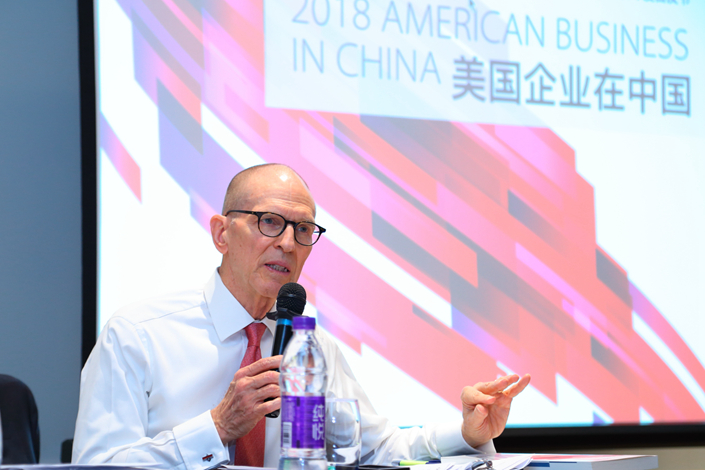AmCham China Lauds Beijing’s Opening, But Urges More

*The American Chamber of Commerce in China praised the easing of foreign ownership restrictions in the credit rating and securities sectors
*The group’s chairman said the biggest challenge facing member firms is the ‘lack of transparent regulations and inconsistent enforcement’
The American Chamber of Commerce in China (AmCham China) said that while it appreciates China’s opening to foreign investors in certain sectors, it urges more communication between U.S. and Chinese authorities in high-tech and agriculture.
China has made significant progress in easing foreign ownership restrictions on foreign-affiliated credit-rating agencies and eliminating ownership caps on securities joint ventures, according to AmChina China’s latest white paper, published on Wednesday.
However, foreign investment limits remain in areas including health care services, media and entertainment, said AmCham China Chairman William Zarit.
The largest business challenge for the group’s members, which represent some 900 U.S. companies, is the “lack of transparent regulations and inconsistent enforcement” in China, Zarit said.
According to the white paper, 46% of members surveyed in 2017 agreed that China would further open up its markets to foreign investment, which was 12 percentage points higher than a year before. But Zarit noted that the survey was conducted between October and November, when U.S. President Donald Trump was visiting China and as relations seemed to be warming. With the recent trade friction, the 46% now seems “overly optimistic,” he said.
“This year the world’s two largest economies face some of their most significant bilateral challenges in the past 40 years,” Zarit said. U.S. officials should carry out “sustained communication with the Chinese authorities,” particularly in areas including agriculture and high-tech trade promotion, he said.
Zarit’s comments come just a day after the White House said it will move forward with its plan to impose a 25% tariff on $50 billion worth of goods imported from China and place restrictions on Chinese investment in “industrially significant technology” in the U.S.
China said the White House’s backtracking on its promise to call a truce in the growing trade war was “tactical.” But Zarit didn’t consider it “only a tactic,” explaining that the U.S. Trade Representative Robert Lighthizer “is very much in favor of using tariffs, whether or not it is the most effective way.”
“Overall, tariffs are a very blunt instrument to address very serious and very complex problems and for trade investment relationships,” said Lester Ross, chairman of AmCham China’s Policy Committee.
Contact reporter Coco Feng (renkefeng@caixin.com)

- 1Cover Story: China Carves Out a Narrow Path for Offshore Asset Tokenization
- 2Drownings Shake Chinese Enthusiasm for Travel to Russia
- 3China Business Uncovered Podcast: A $15 Billion Bitcoin Seizure and the Fall of a Cybercrime Kingpin
- 4Over Half of China’s Provinces Cut Revenue Targets
- 5Li Ka-Shing’s Port Empire Hit by Forced Takeover Amid Panama Legal Dispute
- 1Power To The People: Pintec Serves A Booming Consumer Class
- 2Largest hotel group in Europe accepts UnionPay
- 3UnionPay mobile QuickPass debuts in Hong Kong
- 4UnionPay International launches premium catering privilege U Dining Collection
- 5UnionPay International’s U Plan has covered over 1600 stores overseas






